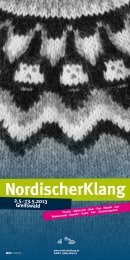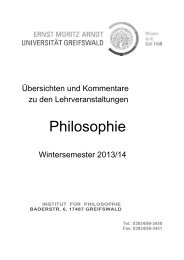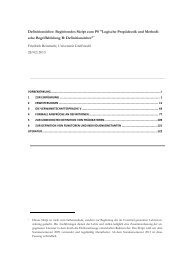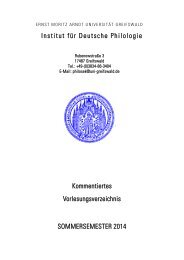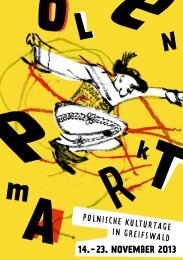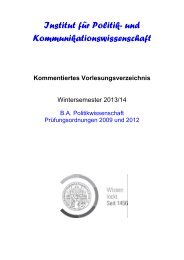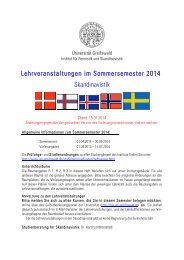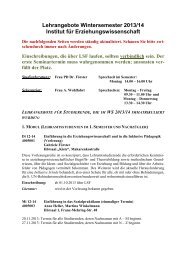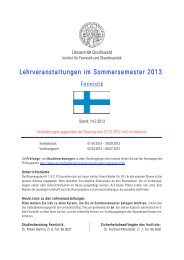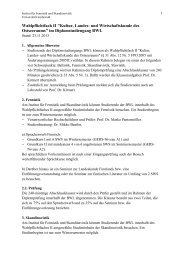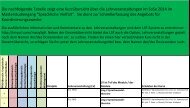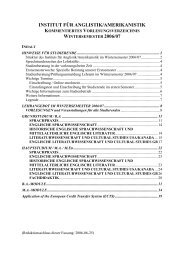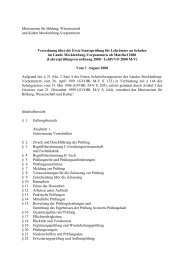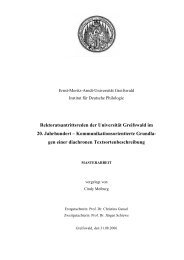ANGLISTIK/AMERIKANISTIK
ANGLISTIK/AMERIKANISTIK
ANGLISTIK/AMERIKANISTIK
Create successful ePaper yourself
Turn your PDF publications into a flip-book with our unique Google optimized e-Paper software.
manifested on various levels, economically by the breakdown of the studio system and the<br />
breakthrough of independent production, aesthetically by the innovative use of the medium<br />
that a new generation of filmmakers (Scorsese, Coppola, Altman, Spielberg) brought to the<br />
screen, ideologically by the committed and occasionally daring critique of American politics<br />
in plenty of films. For all its innovations, ‘New Hollywood’ also paved the way for the<br />
mainstream cinema of today when its creative potential petered out in the late 1970s. We will<br />
watch and analyze some of the most popular and some of the more obscure examples of this<br />
transitional period in American cinema, with respect to the socio-cultural contexts of civil<br />
rights movement, Vietnam War, and counter-culture.<br />
maximum participants: 20<br />
Canadian Northern Development (Hauptseminar) 4002080<br />
2 SWS ab 5. Sem. Do 10-12 R 24 Peter Kulchyski<br />
This course will begin with a look at the arctic and subarctic environments before turning to<br />
description of indigenous cultures of these regions in Canada. The course will then turn to the<br />
history of colonialism and decolonization in northern Canada, and, finally, an examination of<br />
contemporary developments and conflicts. The emphasis will be on the Yukon, Northwest<br />
and Nunavut territories. Particular events that will be discussed include the gold rush in the<br />
Yukon, the Mackenzie Valley Pipeline proposals of the mid seventies and today, and issues<br />
around global warming in Nunavut. Contemporary indigenous community life among Dene<br />
and Inuit will also be a focus of concern in the course.<br />
maximum participants: 25<br />
Aboriginal Cultures and Cultural Politics in Canada (Hauptseminar) 4002081<br />
2 SWS ab 5. Sem. Do 14-16 R 23 Peter Kulchyski<br />
This course will look at the place of Aboriginal peoples in the cultural history of Canada. In<br />
the first hundred years of Canadian history, Aboriginal peoples were culturally ‘excluded’<br />
from the national project, through art practice such as that of the Group of Seven constructing<br />
a notion of empty wilderness, through to the historical and anthropological writings of Harold<br />
Innis and Diamond Jenness in the 1930s. Beginning in the seventies a cultural shift takes<br />
place, in which Aboriginal culture become ‘appropriated’ for the national project, though with<br />
equally problematic results for indigenous communities and artistic practitioners. The course<br />
will draw on examples from visual arts, literature, popular culture, performing arts and film.<br />
maximum participants: 25<br />
Kolloquium für B.A. und Examenskandidat/inn/en (Kolloquium) 4002099<br />
1 SWS letztes Semester Mi 10-12 R 24 Hartmut Lutz<br />
Dieses Kolloquium ist obligatorisch für alle B.A.-, M.A.-, Magister- und Lehramts-<br />
Studierenden, die im Sommersemester 2010 bzw. im Herbst 2010 ihren Studienabschluss in<br />
Amerikanistik/Kanadistik anstreben, und die sich bei Prof. Lutz als Erstgutachter von<br />
Abschlussarbeiten, als Klausurthemensteller und/oder als mündlicher Prüfer anmelden<br />
wollen oder bereits in der Sprechstunde angemeldet haben. Ziel der Veranstaltung ist es,<br />
Prüfungsängste abzubauen und Vernetzungen der Kandidat(inn)en untereinander zu<br />
ermöglichen, indem wir uns mittels konkreter Beispiele mit den Prüfungsabläufen vertraut<br />
machen, Thesenblätter diskutieren und sinnvolle Formen der Vorbereitung diskutieren.<br />
Anstatt dies in Einzelgesprächen in Sprechstunden immer wieder abzuspulen, ist es<br />
sinnvoller, dass wir dies gemeinsam tun und allen betroffenen Examenskandidat(inn)en<br />
ermöglichen, sich gegenseitig in Lerngruppen zu stützen.<br />
maximum participants: 20<br />
24



